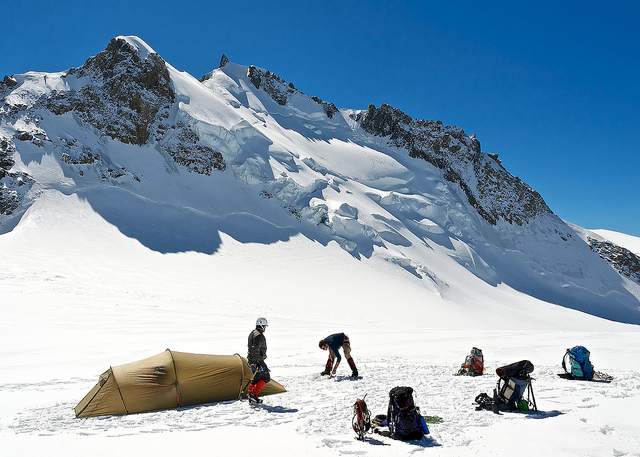For many people, winter is their choice over summer for seasonal traveling, as visiting snowy mountains is one of the best adventures you can experience in a lifetime. Others may find the idea interesting, but do not want to put up with the cold weather and prefer to forego this experience all together. However, this shouldn’t keep you for living this great experience, as there are many tips and tricks to withstand the weather and spend a few nights in cold temperatures. Camping in cold weather means no mosquitos for example, and the landscapes at this locations are usually some of the most beautiful you can see anywhere, not to mention the sounds of nature and the amazing skies. Here at Royal Holiday Travel we always give you the best tips and advice to enjoy your holidays to the fullest, so today we can show you that just a few precautions and a bit of planning can make camping in cold weather a pleasant experience without the need to be uncomfortable.
Tips to camp in the snow.
Camping at a cold location means being exposed to different circumstances that can affect the way you spend the night, such as strong winds and snow; but having the right resources and taking precautions can ensure that you don’t run into any trouble while doing it.
A good night of sleep: When choosing a camping site in the snow, is best to camp on higher ground and sleep above the surface of snow or dirt in order to avoid some of the cold. Freezing winds may become an issue, so it’s a great idea to build a wall out of the snow to block the cold winds that may hit your tent. Making small trenches around the camp is a great way for water to drain down the mountain and avoid possible avalanches.
Essential gear and tools: In order to be able to sleep and rest at a cold place, is important to have the necessary gear and tools to survive or face any challenges that may arise. Sleeping bags, for example, are absolutely necessary to bring along, especially something that is suited for cold weather and will give you the protection and warmth you need to be able to sleep comfortably. Nice warm blankets and winter clothing can also be used to fill all empty space inside your sleeping bag to help you keep warm.
The most important factor to consider is to have a tent that is made especially for cold weather. These are built with less ventilation and using a thermal material that is more resistant to extreme weather conditions.
When it comes to cooking utensils, the ones used for winter are different from those used in hotter climates as winter cooking gear allow you to heat your food a lot faster with considerably less heat. Eating fatty products can also help the body maintain its body temperature through the night.

Image courtesy of Tom Fahy at Flickr.com
Shelter in the snow: Trees are great spots to set up camp and they can be used to build a better shelter with the use of branches and rocks as construction materials. Branches can be used as a floor into which to place the tent and create some insulation between the ground and your sleeping quarters. They can also be used on top of the roof of the tent along with plastic to give even more protection and to help maintain heat inside the shelter. Bags and other gear can be kept inside a shelter made out of snow and covered with plastic to keep them protected and within reach so they aren’t taking up space inside your tent
Basic snow survival tips: The first thing to keep in mind is not to go around eating fruits and berries that are of unknown origin as the majority of these types of fruits found around snow are poisonous to humans. Eating snow is also not a good idea as it may contain parasites and also the temperature can upset your stomach easily. Snow must be melted and boiled if it’s going to be used for hydration. Food should be well rationed and eaten within an organized schedule in order to maintain the body well fed and healthy.
Resting should always be done over something that isolates the body from the environment in order not to lose a lot of body heat and maintain yourself more comfortable.
Using sunblock is absolutely necessary or at least to protect your skin from the sun since sunburn is quite common is cold weather. This is due to the skin’s inability to feel the heat the same way, which makes people have a higher tolerance for UV rays.
Layering is very important, as sweat freezes and can leave you prone to suffer from hypothermia. Shed clothing when you are doing manual labor so your garments don’t become soaked with sweat and wear them again as you cool off.
Small scrapes and wounds should be cared for immediately as infection or open sores are more difficult to deal with in the cold.
Is advisable to stay in the same place if this has proven to be a suitable campsite instead of going around every night to find another area to set up.

